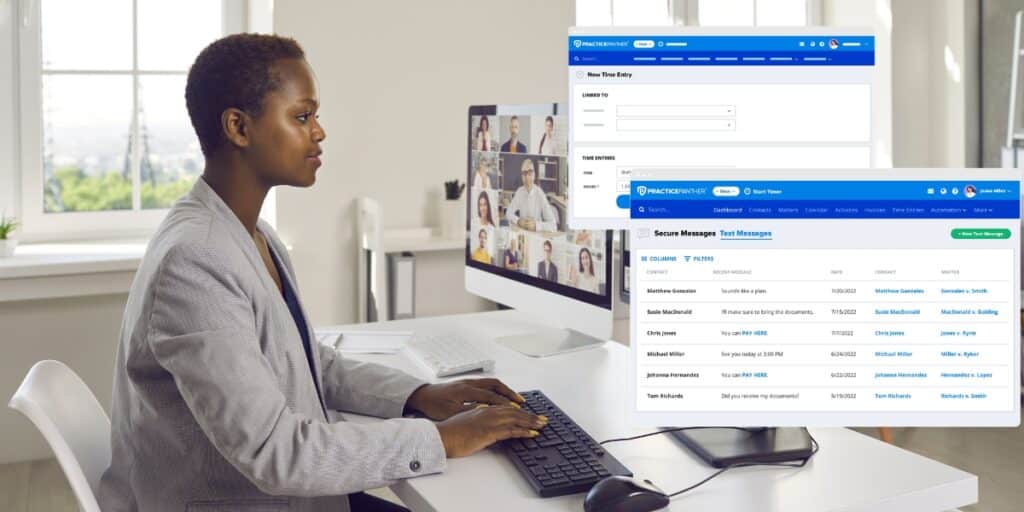Legal practice management software centralizes client information, case files, billing, and more into one accessible platform, helping you manage the myriad tasks involved in day-to-day operations.
This software is designed with lawyers in mind, offering tools to efficiently handle your most time-consuming tasks. Whether you’re managing deadlines, tracking billable hours, or storing important documents, law practice management software can help you stay on top of it all.
Let’s take a closer look at how this technology can transform your daily operations and improve your practice.

What Are the Features of Practice Management Software?
Legal practice management software (LPMS) combines various tools into one platform, making it easier to handle tasks like case management, billing, time tracking, and client communication. Think of it as your digital office manager, organizing everything in a way that saves time and reduces errors. Some of its key features include:
Case Management
One of the standout features of LPMS is case management. LPMS allows you to store and manage all your case-related information in one place. This centralized practice management system for a legal setting means you no longer have to sift through piles of paper or numerous digital folders to find what you need.
Time Tracking and Billing
Accurately recording billable hours can be tedious, but LPMS makes it straightforward. You can log your time as you work, ensuring you don’t miss recording any billable hours. At the end of the billing cycle, generating invoices takes minutes instead of hours, and you can be confident that you’ve accounted for all your work.
Client Communication
LPMS often includes features like secure text messaging, email integration, and client portals. These tools help maintain clear and organized communication with your clients. For example, you can send a secure message to a client with updates on their case, knowing the information is protected. Additionally, client portals allow clients to access their case information, documents, and billing details, which saves your team time communicating those details.
Document Management
Think about how often you need to share documents with colleagues or clients. With LPMS, you can store, organize, and share documents securely. Legal software allows you to do this effortlessly, ensuring everyone can access the latest versions without the risk of data breaches.
Calendaring
In the hustle of legal practice, keeping track of every court date, client meeting, and critical deadline can feel overwhelming. With a robust calendaring feature in practice management software, you can schedule all these events in one central location. LPMS can also send you reminders leading up to each event, reducing the risk of missing appointments or court appearances.
Task Management
In the legal profession, managing tasks efficiently can make the difference between a well-oiled practice and one that constantly plays catch-up. Automated task management features in practice management software allow you to create, assign, and track tasks precisely. LPMS also provides a clear view of task statuses, showing you what’s pending, what’s in progress, and what’s completed.
Reporting and Analytics
You can find treasure troves of data, broken down neatly into various reports, to back and inform the numerous business decisions you must make for your law firm. The reporting and analytics tools within LPMS transform raw data into actionable intelligence, giving you the edge needed to drive your practice forward. With a few clicks, you can generate detailed reports on billable hours, revenue, and case progress.

What Are the Tasks That Can Be Completed Using Practice Management Software?
While practice management software offers a variety of features, the specific tasks it handles can make a day in the life of a lawyer much more manageable. Some of the more concrete tasks that the top legal management platforms can handle include:
- Logging detailed client consultations and notes
- Scheduling court appearances and setting reminders
- Tracking expenses and billable hours in real time during tasks
- Obtaining eSignatures on documents to streamline the signing process
- Generating detailed client invoices quickly
- Storing and organizing case files securely
- Managing comprehensive client contact information
- Drafting documents using customizable legal templates
- Assigning tasks to associates and tracking progress
- Logging and managing discovery materials systematically
- Running conflict checks for new clients and cases
- Processing law firm ePayments for quicker and more secure client transactions
- Generating financial reports for firm performance analysis
- Tracking retainer balances and client account statuses
- Sending payment reminders to clients for outstanding invoices
These tasks highlight just some of the extensive capabilities of practice management software in streamlining and simplifying various aspects of legal practice.
What Is the Value of Law Practice Management Tools?
The value of law practice management tools might not be immediately obvious, but let’s break it down. Imagine all the hours you spend on administrative tasks — each one is time you’re not billing clients. LPMS automates those mundane tasks, freeing up your time to do what you do best: practice law.
Consider your financial stability as well. Accurate tracking of billable hours and expenses ensures you’re capturing all potential revenue. LPMS helps you have a predictable cash flow that lets you confidently plan for your firm’s future.
Security is also a major benefit. You handle sensitive client information daily, and keeping it safe is vital to your practice. Practice management software provides advanced security features, giving you peace of mind and protecting your firm’s reputation.
In essence, LPMS helps you work smarter and build a more profitable and secure practice. It frees you from administrative burdens, enhances your financial management, and protects your valuable data. It’s an investment that pays off in more ways than one, setting you up for long-term success.

When To Use Practice Management Software at a Law Firm
Knowing when to implement practice management software can make a huge difference in your practice. If you’re on the fence, here are some questions to consider:
- Do you frequently miss filing deadlines or court dates?
- Are you spending more time on administrative paperwork than preparing for cases or meeting with clients?
- Is it challenging to find case documents or client information quickly when needed?
- Do you have trouble keeping accurate records of your billable hours, often resulting in lost revenue?
- Are your invoices often delayed or incorrect, causing frustration for you and your clients?
- Is managing client communication across multiple channels (email, phone, in-person) becoming chaotic?
- Have you experienced or are you concerned about data breaches or confidentiality issues?
- Do you lack clear visibility into your firm’s financial health and performance metrics?
If you nodded along to any of these questions, it’s probably time to look at practice management software. The best legal management platforms can streamline your operations, making your practice more efficient and productive.
Take PracticePanther, for example. It’s designed specifically for law firms and offers solutions to these exact challenges. Whether it’s managing deadlines, automating administrative tasks, or securely storing client information, PracticePanther can help. It makes tracking billable hours and generating invoices straightforward, ensuring you capture all your work and get paid promptly.
To see how PracticePanther can benefit your practice, start your free trial or schedule a personalized demo today and take the first step towards a more organized and productive practice.





